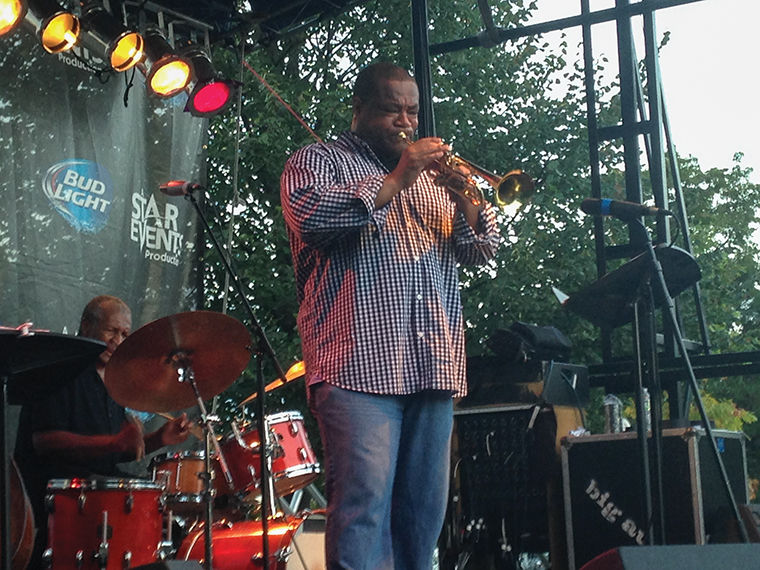Jazz festival brings Hyde Park to its feet
Pharez Whitted played along with the Willie Pickens Quartet at Hyde Park Jazz Festival held Sept. 26–27
October 5, 2015
Attendees danced on the pavement of Midway Plaisance Sept. 27 as the Willie Pickens Quartet grooved through the jazz standard “Afro Blue” at the ninth annual Hyde Park Jazz Festival.
Pianist Pickens said little throughout the performance, but his excited energy had the audience clapping along and dancing in the street by the final number.
“I wanted [the audience] to take away that jazz is still alive, and jazz is music that can make you feel good,” Pickens said after his band’s performance.
Held Sept. 26–27, the festival featured more than 40 performances at 12 venues, including two Chicago public schools, the Hyde Park-Kenwood National Bank Building and Rockefeller Chapel at the University of Chicago.
The festival continues a long-held tradition, as jazz has been a central part of Chicago’s culture since the 1893 World’s Columbian Exposition when the genre’s earliest practitioners were drawn to the city for the nightclub work.
Chicago jazz advanced in 1923 with the emergence of recorded sound, which attracted New Orleans musicians like Louis Armstrong and Jimmy Noone.
The genre’s popularity has seen a sharp decline in recent years, though. In its annual report, Nielsen rated jazz America’s least popular genre of 2014, tied with classical at 1.4 percent of total music consumption.
Still, the genre has survived in Chicago, which may be attributed partly to the Hyde Park Jazz Festival—which is run by more than 300 volunteers—and its surrounding community.
“The community on the South Side is so interested and receptive to the festival,” said Kate Dumbleton, executive and artistic director of the Hyde Park Jazz Festival. “We have [a] tremendous amount of support from the community in terms of volunteers.”
Festival co-founder Judith E. Stein said one of the main goals she had in creating the festival was drawing people into the community, noting the event has achieved that goal.
“It brings people together from all walks of life so they interact in a positive and happy environment,” Stein said. “It’s great to see people mingling and enjoying themselves with music as the force that’s bringing them together.”
Dumbleton said the Hyde Park Jazz Festival stands out from other festivals because it is not organized by a corporation but by the Hyde Park community.
“It started when a group of South Side [residents] who have a pop-up jazz club every Sunday night—the Hyde Park Jazz Society—decided they wanted to have a festival,” Dumbleton said. “I think the reason it’s special is it’s not coming from an institution, it’s coming from a community deciding to celebrate its own culture.”
The Hyde Park Jazz Society has sponsored the festival since its 2006 inception. The non-profit organization, formed in 1995 by James W. Wagner as the Committee to Restore Jazz to Hyde Park, has also held CheckerJAZZ—a series of Sunday night jazz concerts—since 2006 in addition to the annual festival.
Stein said many of the artists who performed at CheckerJAZZ also play at the festival, including Bill McFarland & the Chicago Horns, Pat Mallinger and Ari Brown.
“We try to book at least a few of the people who are Jazz Society folk,” Stein said. “We want to make sure they get represented.”
Stein also said the jazz fans that regularly attend the Sunday night concerts are likely to attend.
“The people who support our club are also the ones who will come out to the festival, and we can count on them rain or shine,” Stein said.
Pickens, an executive life member of the Hyde Park Jazz Society, has performed with many jazz giants, including Elvin Jones, Wynton Marsalis and Quincy Jones. However, Pickens made a home in Hyde Park and became a Chicago Public Schools teacher. He now teaches at the Northern Illinois University’s School of Music in DeKalb, Illinois.
“I randomly settled in Hyde Park when I first came here from Milwaukee,” Pickens said. “It’s been good for me because it’s an area where the University of Chicago is, which means there’s a lot of new ideas, people that are doing things.”
The Willie Pickens Quartet, featuring trumpeter Pharez Whitted, bassist Kurt Shweitz and drummer Robert Shy, played at the Wagner Stage of Hyde Park Jazz Festival, 1130 Midway Plaisance West Sept. 27. The performance sounded like a friendly competition between Pickens and Whitted.
All four band members soloed over “The Lamp is Low,”—a piece Whitted said was originally adapted from a composition by French impressionist composer Maurice Ravel—with Shy’s swift cymbal tapping carrying the piece through Whitted’s and Pickens’ breezy solos. Pickens played smoothly, following rapidly descending harmonies with tumbling melodies.
Pickens said although the festival brings people together, festival-goers do not support live jazz regularly.
“We get a lot of people there during the festivals, but we don’t get the people to support music in the clubs where it’s necessary for the music to thrive. It’s not supported during the year when musicians need people paying to hear them,” Pickens said. “The people love the music but don’t want to support it financially.”
Dumbleton said the festival has become a mainstay of the area.
“It’s become the signature annual event,” Dumbleton said. “It brings a lot of people to the South Side of Chicago that don’t come very often and allows them to see how vibrant, energetic and beautiful that neighborhood is.”








